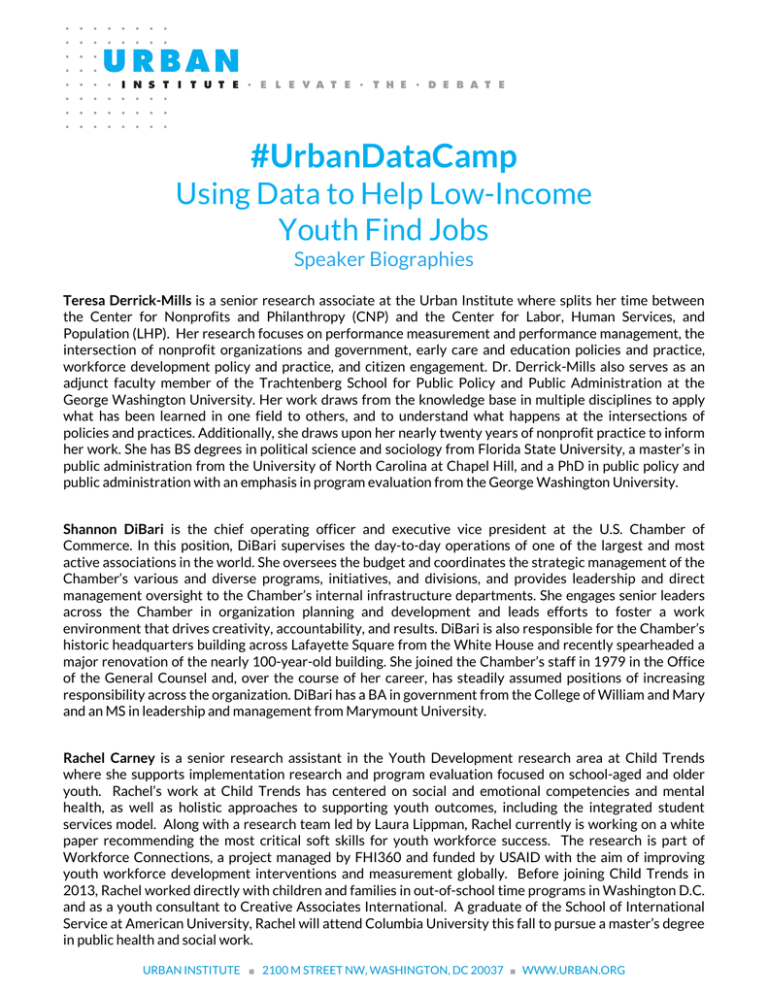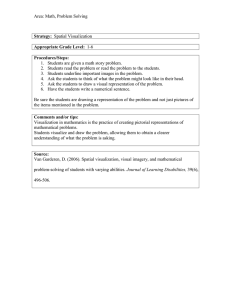#UrbanDataCamp Using Data to Help Low-Income Speaker Biographies
advertisement

#UrbanDataCamp Using Data to Help Low-Income Youth Find Jobs Speaker Biographies Teresa Derrick-Mills is a senior research associate at the Urban Institute where splits her time between the Center for Nonprofits and Philanthropy (CNP) and the Center for Labor, Human Services, and Population (LHP). Her research focuses on performance measurement and performance management, the intersection of nonprofit organizations and government, early care and education policies and practice, workforce development policy and practice, and citizen engagement. Dr. Derrick-Mills also serves as an adjunct faculty member of the Trachtenberg School for Public Policy and Public Administration at the George Washington University. Her work draws from the knowledge base in multiple disciplines to apply what has been learned in one field to others, and to understand what happens at the intersections of policies and practices. Additionally, she draws upon her nearly twenty years of nonprofit practice to inform her work. She has BS degrees in political science and sociology from Florida State University, a master’s in public administration from the University of North Carolina at Chapel Hill, and a PhD in public policy and public administration with an emphasis in program evaluation from the George Washington University. Shannon DiBari is the chief operating officer and executive vice president at the U.S. Chamber of Commerce. In this position, DiBari supervises the day-to-day operations of one of the largest and most active associations in the world. She oversees the budget and coordinates the strategic management of the Chamber’s various and diverse programs, initiatives, and divisions, and provides leadership and direct management oversight to the Chamber’s internal infrastructure departments. She engages senior leaders across the Chamber in organization planning and development and leads efforts to foster a work environment that drives creativity, accountability, and results. DiBari is also responsible for the Chamber’s historic headquarters building across Lafayette Square from the White House and recently spearheaded a major renovation of the nearly 100-year-old building. She joined the Chamber’s staff in 1979 in the Office of the General Counsel and, over the course of her career, has steadily assumed positions of increasing responsibility across the organization. DiBari has a BA in government from the College of William and Mary and an MS in leadership and management from Marymount University. Rachel Carney is a senior research assistant in the Youth Development research area at Child Trends where she supports implementation research and program evaluation focused on school-aged and older youth. Rachel’s work at Child Trends has centered on social and emotional competencies and mental health, as well as holistic approaches to supporting youth outcomes, including the integrated student services model. Along with a research team led by Laura Lippman, Rachel currently is working on a white paper recommending the most critical soft skills for youth workforce success. The research is part of Workforce Connections, a project managed by FHI360 and funded by USAID with the aim of improving youth workforce development interventions and measurement globally. Before joining Child Trends in 2013, Rachel worked directly with children and families in out-of-school time programs in Washington D.C. and as a youth consultant to Creative Associates International. A graduate of the School of International Service at American University, Rachel will attend Columbia University this fall to pursue a master’s degree in public health and social work. URBAN INSTITUTE 2100 M STREET NW, WASHINGTON, DC 20037 WWW.URBAN.ORG Xavier Hughes is the chief innovation officer and senior advisor to the deputy secretary of labor at the U.S. Department of Labor, where he oversees the research and development agenda for open government, the introduction of new technologies to enhance agency customer service, and the use of open data ecosystems to protect the public and encourage problem solving. As chief innovation officer, Xavier leads the identification, evaluation and development of innovative business process and technology applications to improve DOL outcomes and simplify government operations. He is considered a leader in the area of open government and data liberation, having led the development and launch of several crowdsourcing data challenges covering worker safety and health, enforcement, labor statistics, disability employment, and equal pay. Before joining the U.S. Department of Labor, Xavier worked for PRTM Management Consultants where acted as a senior advisor to U.S. Department of Homeland Security senior officials, and provided subject matter expertise to several private sector clients. He has over 14 years of professional experience within the public and private sector, encompassing business process improvement, strategic business planning and development, supply chain, IT platform development, and customer service. Xavier attended the University of Miami where he received an undergraduate degree in business management. Jonathan Schwabish is a senior research associate in the Urban Institute’s Income and Benefits Policy Center. He is also a member of Urban’s Communications team where he specializes in data visualization and presentation design. Schwabish is considered a leader in the data visualization field and is a leading voice for clarity and accessibility in research. He has written on various aspects of how to best visualize data, including technical aspects of creation, design best practices, and how to communicate social science research in more accessible ways. He was named a “visualization thought leader” by AllAnalytics in 2012. He has become a regular presence in data visualization conferences as a keynote speaker, conducts public data visualization training workshops, teaches data visualization and statistics, and regularly speaks about best data visualization practices at private-sector firms, think tanks, and government agencies. Daniel Tsin is the director of evaluation at the Urban Alliance. Tsin joined the Urban Alliance staff in July 2012 as director of evaluation, overseeing all internal program evaluation and performance management. Dan graduated from the College of William and Mary in 2006 with a bachelor’s degree in finance and government. After graduating, he spent three years working in consulting before transitioning to the public sector and working as an analyst for DC Public Schools. Dan holds a master’s degree in public policy from George Washington University, with a focus on program evaluation and education policy. URBAN INSTITUTE 2100 M STREET NW, WASHINGTON, DC 20037 WWW.URBAN.ORG

